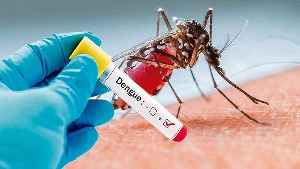The reported outbreak of dengue fever is concerning, particularly as it appears to be spreading to other parts of the country, with reports that it has already moved from the Eastern to the Central Region.
The latest update by the Ghana Health Service (GHS) indicates that the total number of cases recorded as of July 17, is 36.
According to the Ghana Health Service, an investigation has shown a surge in malarial-like conditions in the abovementioned regions, with more samples from suspected cases submitted to the Noguchi Memorial Institute for Medical Research (NMIMR) for confirmation.
Of the reported cases, only one was admitted and subsequently discharged, with the other affected persons being managed at home.
Dengue fever is a mosquito-borne viral infection that can cause severe flu-like symptoms, and in some cases, lead to more serious complications.
Due to its similarity to malaria, Dengue fever bears symptoms like:
Sudden onset of high fever
Severe headache (mostly in the forehead)
Body aches in specific areas like the muscle, bone and joint areas
Nausea and vomiting
Rash
But what must you do to avoid contracting the disease?
The GHS has advised citizens to take these preventive measures to avoid mosquito bites:
Wearing protective clothing
Usage of mosquito repellents
Ensuring water storage containers are tightly covered in your homes
Discarding water in containers if they are not being used
Ensuring that receptacles that could collect water on farms such as empty cocoa pods, coconut shells etc are discarded properly
Sleeping in treated mosquito bed nets
MAG/AE
Watch the latest episode of Everyday People on GhanaWeb TV below:
Health News of Wednesday, 17 July 2024
Source: www.ghanaweb.com

















